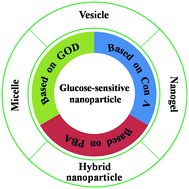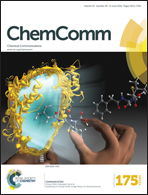Glucose-sensitive polymer nanoparticles for self-regulated drug delivery
Abstract
Glucose-sensitive drug delivery systems, which can continuously and automatically regulate drug release based on the concentration of glucose, have attracted much interest in recent years. Self-regulated drug delivery platforms have potential application in diabetes treatment to reduce the intervention and improve the quality of life for patients. At present, there are three types of glucose-sensitive drug delivery systems based on glucose oxidase (GOD), concanavalin A (Con A), and phenylboronic acid (PBA) respectively. This review covers the recent advances in GOD-, Con A-, or PBA-mediated glucose-sensitive nanoscale drug delivery systems, and provides their major challenges and opportunities.



 Please wait while we load your content...
Please wait while we load your content...